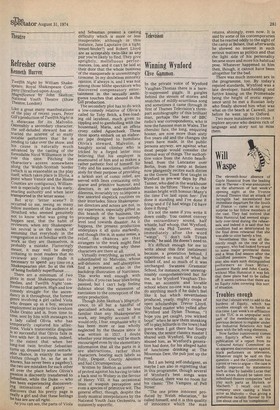Theatre
Refresher course
Kenneth tlurren;
Twelfth Night by William Shakespeare; Royal Shakespeare Company (Stratford-upon-Avon) Magnificence by John Skelton; National Youth Theatre (Shaw Theatre, London) Like a great many manifestations of the play of recent years, Peter Gill's production of Twelfth Night is a showcase for its Malvolio. Ostensibly a secondary character, the self-deluded steward has attracted the interest of so many notable performers that he is tending to take over the show, and his cause is naturally much advanced by the casting of the formidable Nicol Williamson in the role this time. Pitching the character's accent somewhere along the Welsh-Scottish border (which is as reasonable as the play itself, which takes place in Illyria, a Point where Venice and the Home Counties are contiguous), Williamson is especially good in his early, snarling authority and when later transported in the letter scene.
But stay: 'letter scene'? It occurred to me, seeing so many fellow members of the audience at Stratford who seemed genuinely not to know what was going to happen next, that the habit of reviewers, when any Shakespearian revival is on the stocks, of assuming that everybody in the congregation is as familiar with the work as they are themselves, is probably a mistake. Flatteringly meant, it may well be deeply irritating to most readers that no reviewer any longer finds it necessary to spend any time on a_ Shakespearian plot. So at the risk of being foolishly superfluous .. .
There are a minimum of two Plots in most Shakespearian comedies, and Twelfth Night 'conforms to that pattern. High and low comedy struggle for the ascendancy in it throughout, the former genre involving a girl called Viola Who dresses up as a boy, secures employment as page to the lovelorn Duke Orsino and is, from time to time, sent by him with messages to a lady called Olivia who has temporarily captured his affections. Viola's transvestite disguise is so successful that Olivia falls in love with her. It succeeds, indeed, to the extent that when her long-lost twin brother Sebastian turns up, dressed by some remarkable chance, in exactly the same clothes (though he, so far as is known, has never been a pageboy), the two are mistaken for each other all over the place before Olivia's passion is discreetly transferred to Sebastian, while the Duke — who has been experiencing disconverting intimations of gaiety — discovers that his pretty page is really a girl and that these feelings he has are are all right.
As you can see, the parts of Viola and Sebastian present a casting difficulty which is more or less insuperable; although in this instance, Jane Lapotaire (in a tight breast-binder?) and Robert Lloyd are as acceptably twin-like as any pair you're likely to find. They give sprightly, mellifluous performances, too, and it can't be laid at their door that the whole business ' of the masquerade is unremittingly tiresome. In my doubtless minority opinion, it' always is, and I was not among those blithe spectators who discovered compensatory entertainment in the sexually ambiguous touches that abound in, the Gill production.
The secondary plot has to do with a low-comedy relative of Olivia's called Sir Toby Belch, a free-loading old layabout, much given to tippling and to gambolling with the housemaid, Maria, and an effete crony called Aguecheek. These three sports embark on an elaborate jape designed to humiliate Olivia's steward, Malvolio, a haughty social climber who is tricked by a forged letter into believing that his employer is enamoured of him and so makes a rather pathetic fool of himself. Sir Toby and his associates, unfortunately for their purpose of providing a larkish sort of comic relief, are served with lines containing only Sparse and primitive humour, and directors, in an understandable dilemma, invariably try to irripose a few assorted slapstick routines on their interludes. Since Shakespearian directors and actors are not, in my experience, especially gifted in this branch of the business, the proceedings at the low-comedy level tend towards disaster. As it happens, the present production underplays it all quite markedly, and though this is, in some sense, a relief, the chances are that strangers to the work might find themselves wondering why these characters are there at all.
Virtually everything, as noted, is subordinated to Malvolio, whose self-delusion and self-absorption find a permanent echo in the backdrop illustration of Narcissus. This works well enough with Malvolio, if you can bear lilies being painted, but I can't help feeling dubious about the extension of narcissism to the conception of the entire production.
Though John Skelton's Magnyficence, to all but a handful of specialised scholars, will be less familiar than any Shakespearian work, any lengthy account of it would only, I fear, emphasise why it has been more or less wholly neglected by the theatre since it was written in 1517. I doubt whether your interest will be much encouraged even by the elementary information that all the parts in it are abstractions, rather than characters, bearing such labels as Folly, Despair, Courtly Abusion and Sad Circumspection.
Written by Skelton as some sort of protest against his having to take a back seat to Wolsey in the favour of Henry VIII, it has occasional lines of waspish perception and even a species of primitive wit. The general effect, though, despite the lively musical interpolations by the National Youth Jazz Orchestra, is insistently soporific.


































 Previous page
Previous page